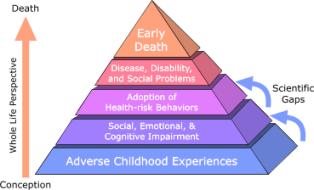The Adverse Childhood Experiences (ACE) Study is one of the largest medical investigations ever conducted to assess associations between childhood maltreatment and later-life health and well-being. This research began in 1998 under the leadership of Dr. Vincent Felitti. The Centers for Disease Control and Prevention and Kaiser Permanente’s Health Appraisal Clinic in San Diego continue to work in collaboration of this research today.
More than 17,000 Health Maintenance Organization (HMO) members undergoing a comprehensive physical examination chose to provide detailed information about their childhood experience of abuse, neglect, and family dysfunction. To date, more than 50 scientific articles have been published and more than100 conference and workshop presentations have been made.
The ACE Study findings suggest that certain childhood experiences are major risk factors for the leading causes of illness and death, as well as poor quality of life,in the United States.It is critical to understand how some of the worst health and social problems in our nation can arise as a consequence of adverse childhood experiences. The good news? All of them are preventable. ACE’s can include a child’s exposure to:
- Domestic Violence (verbal, emotional, economic, or physical abuse of a parent or child)
- Sexual abuse (in any form)
- Being separated from a primary-attachment parent (typically the parent that was the primary caregiver in the child’s first seven years of life)
Understanding these connections, in particular when families are in the process of divorce and custody litigation, will improve the health, safety, and overall wellbeing for the lifespan of that child.
